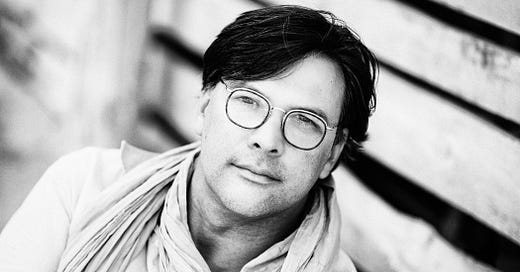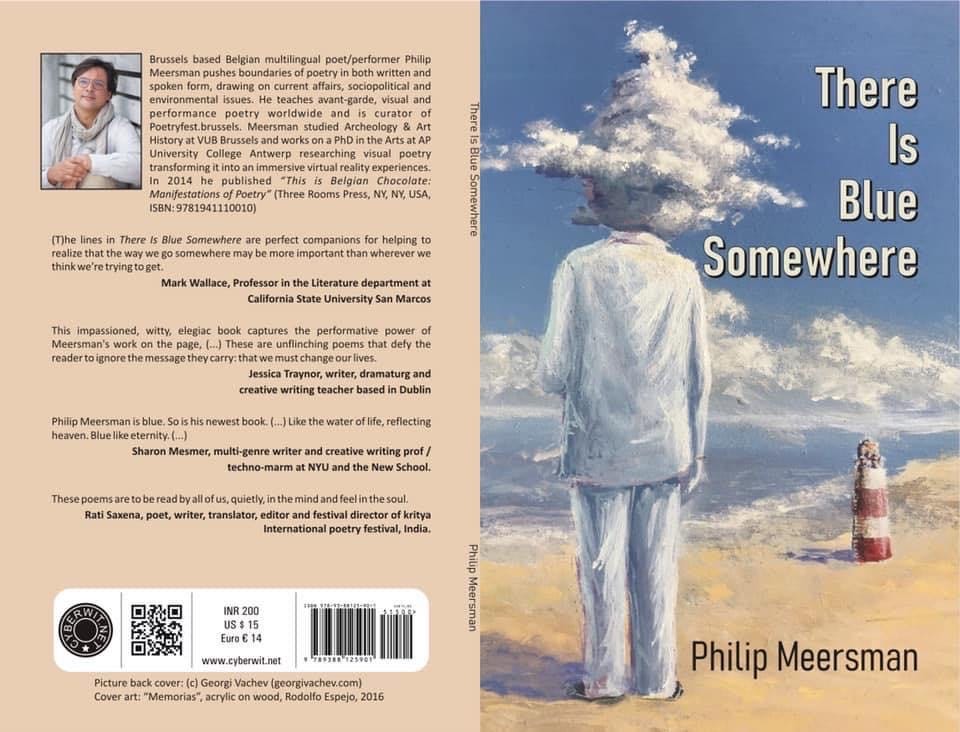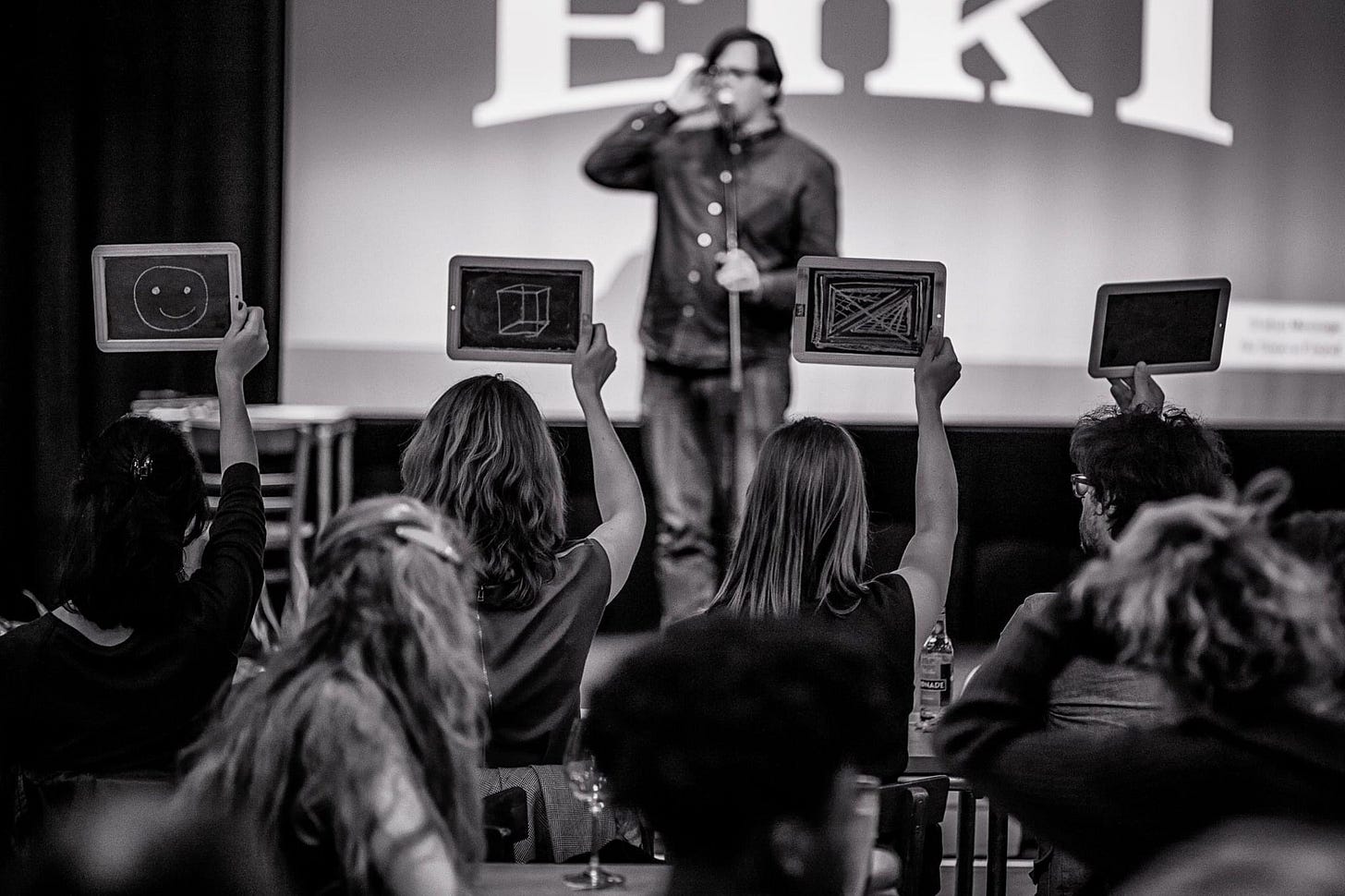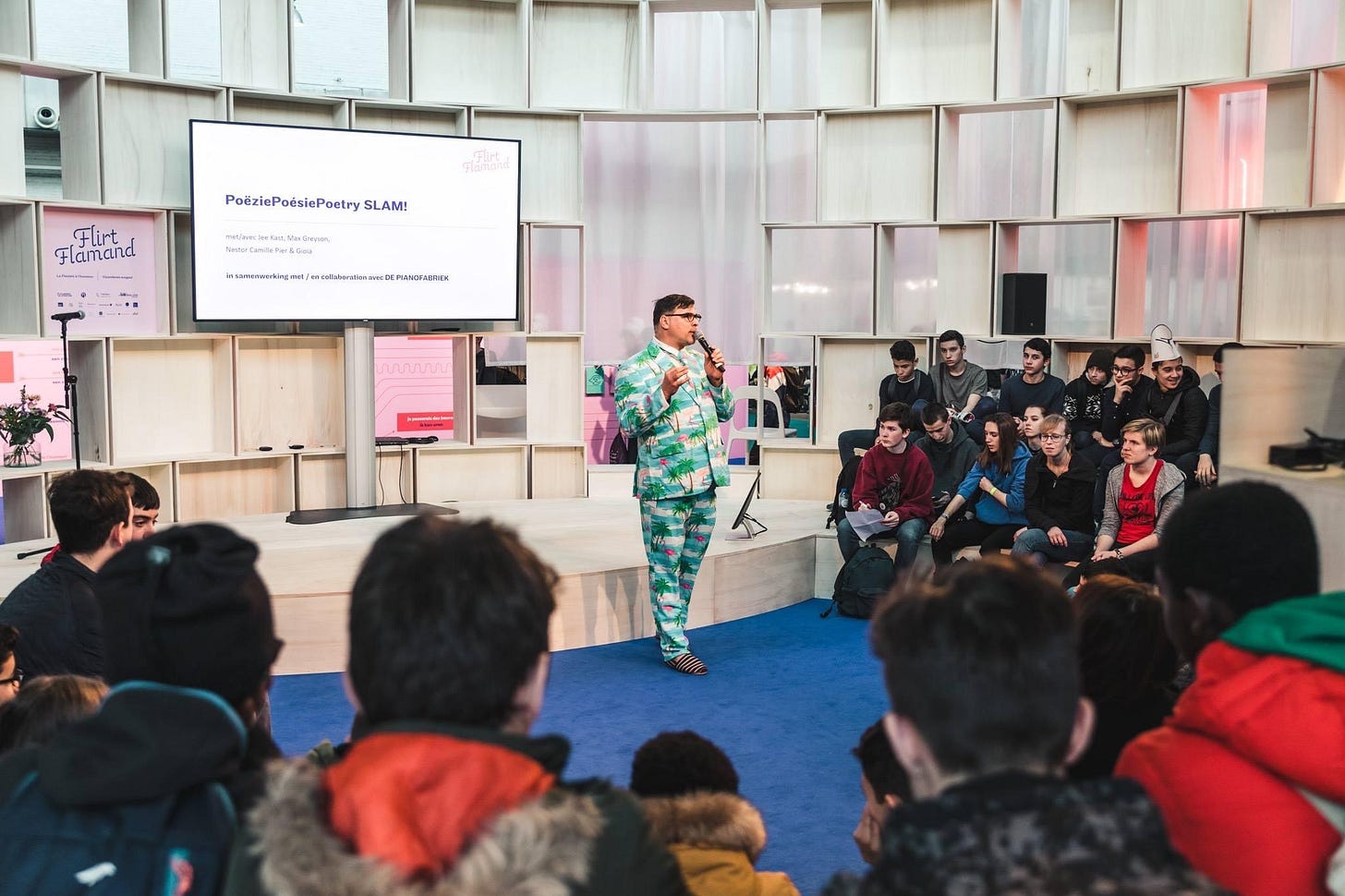Poet, performer, activist, and visionary! As expected, my conversation with Philip Meersman was layered and intricate, with interwoven themes revealing a life immersed in the poetry he not only creates but so passionately champions.
Towards the end of the conversation, Philip made a statement, in a moment of contemplation, that felt like both the perfect opening and an insightful closing to his story. “Finally, I am breathing!”
Those captivating words offer a profound glimpse into Philip’s lifelong journey with poetry and to a soul deeply connected to and intertwined with the art. Added to that, they also echo the essence of the Flourish Digimag Online slogan “sharing the extraordinary”.
Philip certainly does live and breathe poetry! It is not just something he does; it is something he is! One of the many descriptions on Philip found on the world wide web – this one taken from the Royal Academy of Fine Arts Antwerp - reads:
Philip Meersman is a multilingual poet, curator, moderator, and PhD candidate at the Royal Academy of Fine Arts Antwerp. He has performed at some of the most important poetry festivals in the world and is the initiator and co-founder of the World Poetry Slam Organization, a worldwide network of national slam competitions. He coordinates the itinerant European & World Championships Poetry Slam and has published two collections of poetry in English and one in Dutch.
Meersman turns his poems into sculptural, location-bound works of art, dates them as visual artists do and provides them with a marker of the creation location and the used writing techniques and materials. His poetry books are therefore not only collections of poetry but also travel chronicles and exhibition catalogues. Next to performing, Meersman also writes, talks and teaches about poetry in all its forms during lectures, workshops and in all forms of publications.
Through our conversation, I discovered that poetry for Phillip is like riding a bicycle, it is an innate part of him, embedded into the life he leads and into the psyche of who he is! And, like riding a bicycle, his poetry has taken him down roads and along journeys criss-crossing the breadth of his fascinating life.
Growing up in Flanders, between Antwerp and Ghent, in the medium-sized town of Sint-Niklaas, Philip was surrounded by a historical, cultural and somewhat bourgeois environment. With a population of just 60,000 at the time, the town offered a lifestyle that provided a freedom not often found in larger cities. That sense of freedom certainly played a role in the years to come and in shaping the man he is today. At home, however, Philip experienced a difficult, tough childhood. The lesson for not listening was usually a heavy slap, and violence was a frequent form of communication. Alongside this, a deep fear of nuclear war was ingrained in the community, with constant reminders that if not imminent, it was certainly a very real possibility. His mother even kept shelves stocked with tinned goods, preparing for a threat that seemed ever-present. His parents, having grown up during the Second World War, carried the burden of this constant fear, a mindset that left its mark on the young Philip.
With his father a policeman and his mother working as a cook, Philip’s family struggled financially and while they never went without the basics, there was a persistent sense of scarcity. Adding to this were health issues within the family, creating an environment he now recognizes as being “heavy” during his formative years. While at primary school, cancer was a frequent visitor in the family, leading to a home life marked by crisis after crisis. His only sister, being five years older, was in a different stage of life, navigating it in her own way.
Like many young people, school provided a distraction, and the first indication of the path Philip would eventually follow began to take shape. Drama became his subject of choice, which he did alongside his regular curriculum. Attending evening classes, he learned eloquence, how to express his emotions, gaining confidence in public speaking and stage presence. He delved into the study of human emotions, understanding character and body language awareness, while also being introduced to creativity and improvisation. These lessons, invaluable in hindsight, became crucial tools that Philip would draw upon throughout his life.
Externally, the world was shifting! Philip, born in 1971, was a teenager when experiencing the explosive energy and exhilarating chaos of the late 80’s. In 1989, during his first year at university and just 18 years old, he bussed to Berlin to witness and take part in the historic breaking of THE wall. It was an experience that undoubtedly became fuel for his poetry – and fuelled Philip was! He first self-published book of poetry emerged during this time, reflecting the deep connection he had to the world around him and the history shaping his generation.
Philip envisioned his immediate future involved going to university and as his passion lay in the arts, to study as possibly a theatre content creator or director. His parents, however, dismissed the idea entirely, insisting instead that he pursue a law degree. Reluctantly, he agreed and actually found his first two years interesting. Subjects like sociology, history (both contemporary and past), and geopolitical studies certainly captured his interest. By the third year, however, the reality of studying law set in and in his characteristic honesty, he admits he simply found it too boring! He knew he couldn’t continue, regardless of his parent’s expectations. Standing his ground came at a cost as he was abruptly told to leave home and fend for himself. To make matters worse, a bad relationship choice led him further off course, and for a time he felt adrift and uncertain about his future.
Leaving university and abandoning his law degree proved to be a pivotal decision - one that ultimately reshaped his life, steering him towards the arts, although certainly not along a direct path! The immediate need to earn a living took precedence, so with no degree behind him and no clear direction, Philip turned to the restaurant trade. He started at the bottom, taking on odd jobs, clearing tables and waitering, but quickly found his niche and remained in the industry for the next twenty years. His natural ability with both people and in organization saw him swiftly rise into a managerial role, overseeing a bustling restaurant with a spacious open terrace that thrived in the summer months. Managing a large team in such a fast-paced, high-energy environment became another invaluable experience and certainly equipped him well for the path that was to follow.
Philip’s journey, by now married, unfortunately took another turn when health challenges forced him to reconsider his future in such a busy environment. Finding himself again at a crossroad, he took on an administrative clerk role at a small to medium-sized business. It was humbling in many ways and a huge shift in his life, far from the future he had once envisioned. During this time, he also went through a divorce, prompting a move to Brussels. While still working in various administrative roles, Philip decided to return to university, enrolling in evening classes at the Flemish Free University of Brussels to finally pursue a bachelor’s and master’s degree in the arts. This time, the academic path aligned with his interests, as he specialised in ART SCIENCES and ARCHAEOLOGY. His studies led him to explore transforming poetry into an immersive experience where “creating words is a physical event” – one that deeply engages audiences, marking the beginning of a new and creative chapter in his life.
In August 2005 Philip was invited to the Struga Poetry Evenings in North Macedonia by Festival Director Zoran Anchevski. The invitation came following a recommendation by Belgian Ambassador Philippe Beke, who had seen Philip perform in Sofia, Bulgaria earlier that year. The performance was part of a dedicated event organised by translator from Dutch to Bulgarian, Aneta Dancheva, in the framework of a translation residency focused on the play “The Carp” by Rumen Shomov, which Philip translated to Dutch using English as the bridge language.
Being acknowledged, solely for his poetry and his contributions to the field, was not only a significant achievement but also the beginning of an even broader artistic journey. In time Philip remarried and was blessed with twins. However, when his young son became extremely ill with serious ongoing pneumonia, Philip made the decision to resign from full-time work and become a stay-at-home and hands-on father. Although this period was difficult at times, it was also when he firmly established his presence as a performer and his life working with poetry. His passion for the stage, first ignited in his school drama days had never faded, and stepping back into it felt like aligning with the natural flow of his life. With his son’s health improved and now qualified, Philip secured a position as the Cultural Program Developer at a community centre in Brussels, where he worked for the next five years. This role was suited to his interests and experience, being responsible for organising weekly and monthly programs for stage performances, with a particular focus on bringing the spoken word into a theatre setting, moving away from the traditional forms of poetry that were generally known at the time.
By 2014, with the release of This is Belgian Chocolate: Manifestations of Poetry by Three Rooms Press, Philip’s work began to gain international recognition. This incredible milestone, firmly established Philip as a published, recognized and accomplished poet. In time, his work would be published in international journals and anthologies, being translated into 15 languages. His inclusion in an anthology with Three Rooms Press led to an exciting book tour, including a presentation in Paris. Since then and while often challenging, Philip has stayed true to his creative path, living as a full-time artist. His written word has spanned various genres and has been published in different magazines, through university blogs and journals. He has also fully embraced the new frontier of poetry performance. That genre has been a fascinating one and is a world in which he thrives! Vibrant and relevant, it holds a distinct place in the poetry world.
When I asked Philip the difference between slam poetry, poetry slam and performance poetry, I was not quite ready for the deep dive that followed! Thankfully, Philip admits it’s a tough question to answer in a short interview! He recommended two excellent pieces that explore the subject in depth:
Both are thought-provoking, exploring the evolving landscape and history of poetry while offering insight into Philip’s approach and his explanation of the three external manifestations of poetry. To further explain, he shared that during his studies in theatre eloquence, he was required to prepare sonnets, prose excerpts, and various other forms of poetry. His task would then be to create a 15-to-20-minute program, seamlessly blending these different genres into a cohesive performance. This structured yet dynamic approach is what would now be recognized as poetry slam or performance poetry.
Philip, and indeed poetry slam, thrives on audience participation, drawing energy from their reactions and connection. Having travelled extensively across Africa, including performing at Poetry Africa in South Africa, Philip observes performance poetry across that continent is often loud, vibrant and is deeply engaging. In contrast, for many European audiences, experiencing performance poetry for the first time can come as a shock.
Philip knows that performance poetry is sometimes perceived as amusing but is quick to clarify that it is not comedy. Rather, it is a powerful expression of the written word, capable of provoking profound emotions. For Philip, the audience’s reaction – their connection – is of primordial importance. He emphasizes that it is not about the poets’ personal emotions while performing, or their connection to the sentiment of the words. Instead, it is about how the audience interprets and relates to the words. The moment a poet brings their work to the stage, Philip believes, they should detach from it. The poem no longer belongs to the poet, if it ever did, but to their audience. It is their experience of the poem, the emotion it invokes and its impact, that holds its true power. For Philip, the ability to evoke raw emotion – pushing an audience beyond their comfort zone, stirring something deeper – is what drives him to return to the stage time and time again. Performance poetry is about creating visceral connection, where the audience feels, rather than hears, what the poet intends to convey.
I asked Philip if he considers himself a performer at heart, given the bravery it takes to be so raw and exposed on stage. Like many of us, Philip finds it difficult to evaluate himself, but his journey within the world he inhabits, speaks for itself! While Philip admits he is quite content to stay behind the scenes, there is also a stage persona within him that emerges when performing, also acknowledging the adrenaline rush experienced on stage. He recognizes this duality in many poets who, despite being reclusive in many ways, can act out the emotions of their poems so vividly on stage. For instance, when performing an erotic, angry or deeply sad poem, even though it comes from a place of deep personal connection, the poet must transform it and themselves on stage, to project those emotions without remaining personally tethered to them. For Philip, this is where the freedom in performance poetry lies, infusing a poem with the expression of dramatic energy, allowing a theatrical question or exclamation and the alchemy of transforming a poem through performance, breathing life into the written word.
Phillips explains that slam poetry is different from a poetry slam event, in that poetry slam is inherently competitive, with the poets competing against each other. He notes that it can also be beneficial for the poet participating to engage in the sociopolitical context of the country where the poetry slam is being held. Being sensitive to this extent could influence the outcome of the performance. It is also this aspect of poetry – the listener’s interpretation, that makes poetry slam difficult to judge, but also extremely exciting to be part of. Philip finds it incredible how a programme, performed with the same emotion and tone, can be received by both the audience and the judges in totally contrasting ways. Philip experienced this firsthand during two poetry slam competitions he entered. His first program was well received, propelling him into the finals. Yet just 14 days later, performing the same programme at the same venue, but in front of a different audience and panel of judges, he didn’t make it past the first round. There is no explanation for this unpredictability, but it is at the heart of what defines a poetry slam. The beauty of its subjectivity is what keeps poetry slam alive and thriving, allowing it to stay vibrant and evolving.
While both the audience’s reaction and judging of slam poetry are subjective, there are specific rules governing the requirements of a poetry slam. Firstly, the poem must be the poet’s own work and there is a time limit for each performance. The poet is not allowed to use any form of props, accessories, or special costumes - although traditional clothing would be accepted.
Although, as Philip notes in his article The Trance of the Read Verbal Artifact, there isn’t a single agreed-upon starting point for poetry slam, Marc Kelly Smith, based in Chicago, is widely credited with founding the movement in the 1980s at the Green Mill, where audiences were first known to play a crucial role in judging performances. Initially, the judging was done by a panel of five random people, using a scorecard to rate the poet on a scale from zero to ten. As poetry slam has grown into an international competition, the judging panel has evolved into an “expert” panel, which could include authors, former champions, theatre directors, or journalists familiar with the genre. Judging criteria has also expanded, with different types and formats of slams now in practise. These range from traditional slams (with no props, costumes or music) to open slams (more beginner-friendly and inclusive) to themed or speciality slams, group slams, no mic slams (held in smaller venues focusing on natural projection and presence) and multilingual slams, where poets blend different linguistic styles. For Philip, however, the concern when removing the randomness of judging is that even an expert panel can carry its own biases. The question arises: how can one ensure personal preferences do not influence the judging process? This leads to the larger question: can poetry truly be judged, or is it the performance itself that invites judgement?
As Philips involvement in poetry slam grows, the movement is also constantly evolving. Today, poetry slam stands proudly as an exciting, vibrant and vital part of the global poetry scene. Looking ahead, the 4th World Poetry Slam Championship 2025 is scheduled to take place in Ciudad Juárez, Mexico, featuring 35 or more top poets from around the world. For Philip, this is an exciting and dynamic time, with the potential for even greater growth. The possibility of having 50 to 60 national slams emerging worldwide, including 10 in Africa, adds to the anticipation of what lies ahead for the art form.
It's truly remarkable and encouraging to hear that poetry, defined by David Whyte as “a language against which we have no defences” is alive and well!
Philip’s involvement in poetry slam has evolved into almost a full-time role, where he now applies his managerial skills to move further into the organizational side of the movement. While this keeps him busy, he admits he does miss performing. To balance this, he engages in smaller, immersive performances and offers workshops outside of poetry slam events. Philip prefers to divide his focus – when organising an event, he commits to it fully, keeping his personal engagements separate and reserved for times when there are no other pressures. Through his workshops, he finds fulfilment in giving back, engaging and encouraging young poets entering the space. The internet has been an invaluable tool in this regard, although not without its challenges. With so much poetry available online, it can be difficult to find the hidden gems. The sheer volume of poetry can drown out the voices of lesser known but potentially “better” poets, with louder, more populist voices often dominating the conversation. Philip’s core advice for would-be performance poets remains simple: get out there, listen and analyse what other poets are doing. Witness their performances, take your own work seriously, push beyond your comfort zone and understand how you truly see yourself as a poet. He also encourages engaging with the older, more experienced generation, as well as avant-garde and neo-avant-garde poets. For Philip, research and academia are essential – understanding the originality of the work, gaining knowledge, and drawing inspiration from it are all vital to a poet’s development.
Philip’s involvement in poetry flows naturally through his life, engaging him fully. For him, poetry simply exists – it always will. When I asked if he follows a writing routine, he shared that usually writing seems easier when he steps away from the busyness and structure of daily life. Travelling and being present in the moment provides him the space to ignite his creativity. Yet, of course, inspiration can be found anywhere, at any time. New ideas can take shape in quiet, reflective moments or amidst the rush of a subway. Words jotted down on the back of a metro ticket or sparked at a festival, often find their way into poems. Poems are like beautifully crafted oil paintings. They can be worked on for years, often evolving with only subtle changes, adapting to different circumstances. Take Van Gogh’s sunflowers – while they all portray the same subject, each painting is uniquely distinct, offering a different perspective, evoking new emotions and revealing a different facet of a sunflower.
Reflecting on my own journey – from years working in construction to now creating Flourish Digimag Online and feeling deeply connected to this path – I asked Philip if he recalls experiencing a moment of clarity, a suspended awareness, when his journey with poetry felt fully affirmed.
He paused. Then, leaning forward toward the screen, his eyes lit up, suddenly caught in a memory. “Yes” he said, “there was that moment.”
It was not long after the confining restrictions of the pandemic had eased when he was invited to perform in Mozambique. Standing on that rustic stage before an unknown audience, when “all the worlds a stage” he experienced that moment of clarity, an affirmation:
“Wow. Finally, I am breathing”
YES, poetry is after all the breath of life released, and like breath, is a miracle to valued, celebrated and fully lived.
THANK YOU PHILIP, FOR SHARING YOUR JOURNEY SO OPENLY - FOR REMINDING US THAT POETRY IS NOT ONLY WRITTEN OR SPOKEN, BUT IS TO BE LIVED AND BREATHED.
Without doubt, we certainly look forward to the continuation of “Breathing through Poetry, with Philip Meersman!”
With warm regards,
SARAH UNSWORTH
Explore Philip Meersman Online
Website: https://spooninmybrain.org
YouTube: https://youtube.com/@spooninmybrain
Linktree: https://linktr.ee/spooninmybrain








